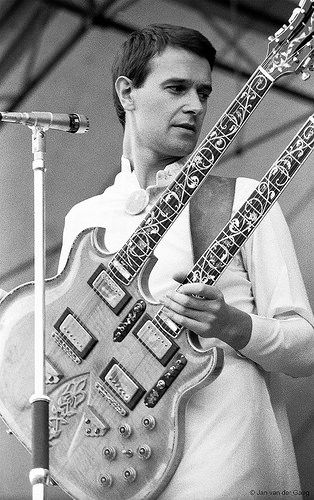3/30/70: Miles Davis – Bitches Brew
When I first began dipping my toe into jazz waters around the age of 19, I went with “safe” choices that even an unlearned, jazz-curious person like me would enjoy, much of which I had heard at least bits of before. You know, the usual suspects: Miles’s Kind of Blue, Brubeck’s Time Out, Ellington at Newport, Monk’s Dream, etc. I kept coming across the title Bitches Brew, reading how its elements of jazz and rock fusion broke down musical barriers, but I didn’t know what that meant. I worked in a jazz-oriented establishment for much of the 1990’s that featured live performances by local and national acts, and slowly my curiosity expanded. One day I finally asked one of my bosses, a knowledgeable jazz fan, his opinion of the album. With a slight grin he responded, “It’s listenable.” Not exactly a ringing endorsement, but fine, I’d just have to buy a copy and decide for myself.

I liked this double album right away, though I couldn’t have told you why. It was unlike anything I’d heard before in jazz or rock. I realize now it was probably due to a combination of the pulsating, somewhat muffled rhythms underlying Davis’s trumpet bursts and delicate piano improvisations by Chick Corea, Larry Young, and Joe Zawinul that it had my attention. I listened again. Gradually I began to appreciate the contributions by fusion guitar master John McLaughlin and soprano saxophonist Wayne Shorter. Pharaoh’s Dance sounds right out of the Dark Continent. The title track which follows puts imagery in my mind of dangerous, deserted early 1970’s New York City streets on top of the tribal rhythms of the opening track. It seems to build upon itself.

Those rhythms. For this album, Davis employed two bassists (Harvey Brooks on one, and Dave Holland on double bass), two to three drummers including Jack DeJohnette from his touring band, two to three electric piano players including Corea, and a percussionist. With some exceptions they all played at the same time. Miles provided his musicians with sketches for them to play whatever they pleased as long as they stayed with Davis’s chosen chord. The opening track of side three, Spanish Key, is one of the funkier ones on the album. Again, the rhythm section pushes intensively while Miles plays on top before an electric piano crescendo brings them together, opening another segment for McLaughlin’s guitar, a little crunchier this time around, then Shorter on alto sax. I listened once again. Finally it dawned on me: This is electric music. Now, I realized this was not a 1950’s piano/bass/drums/saxophone quartet and all, but I didn’t really understand until I stopped comparing it to what relatively little jazz I’d become familiar with. And when I take time to listen to the entire thing, I feel as though I’ve been through something rather intense by the end. As in, worn out.

Bitches Brew, recorded in August of 1969 and released March 30, 1970, opened some musical doors for me. While I’m no connoisseur of free jazz, I was able to enjoy Ornette Coleman’s The Shape of Jazz to Come and Coltrane’s A Love Supreme as a result, the latter combining in a very timely way with my emerging interest in spirituality from the East and West. The Inner Mounting Flame and Birds of Fire by McLaughlin’s Mahavishnu Orchestra became favorites in my small but growing jazz collection. Live Grateful Dead recordings became even more fun to listen to, and Zappa’s Hot Rats made its way into the rotation. Lastly, in checking out his previous two “electric” albums, Filles de Kilimanjaro and In a Silent Way, I was able to hear just how far Miles had taken his new direction in such a short period of time. Great artists who can’t get their ideas recorded quickly enough – I cannot imagine what that’s like. If you don’t know this album but are curious, don’t do as I did and dip your toe in. Dive straight into the deep end.
Tracklist
Side One: Pharaoh’s Dance
Side Two: Bitches Brew
Side Three: Spanish Key, John McLaughlin
Side Four: Miles Runs the Voodoo Down, Sanctuary
-Stephen
https://en.wikipedia.org/wiki/Bitches_Brew

Certainly an album that draws a varied response from people. I like Miles earlier work over this but the man was adventuresome. He could have stuck with what had worked. … on a sort of different subject- would you be interested in participating in a “Album Draft” I am going to organize? Going to get 10 folks who are into music like we are- and have a 10 round draft- like they do in sports. Still working on details/ rules for it. Thought that might be a fun activity.
LikeLike
I’d be interested in hearing the details, yes.
LikeLiked by 1 person
Sounds good- still organizing- one rule I was thinking of- studio albums- no box sets best of greatest hits… how do you feel about live albums? i wouldn’t take one myself but should they be excluded or eligible? Up to 5 participants now… I am thinking we get started July 1- and maybe one selection a day- whoever turn it is that day.
LikeLike
There are so many ways of doing these things. However you want to do it will be fine.
LikeLiked by 1 person
I’ve read more about the album than actually hearing it. I’ve heard bits and pieces through the years. Sounds like something I would like. When ever I hear his name this album comes to mind.
LikeLiked by 1 person